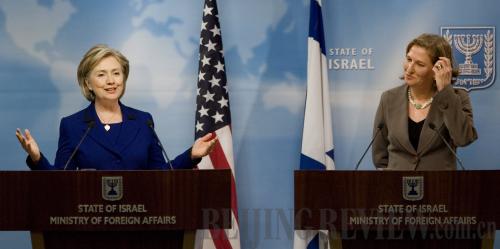|
 |
|
COURTESY OF WANG JINGLIE |
U.S. President Barack Obama began this year with an eye toward sweeping reform. The Israeli-Palestinian issue has been very high on the agenda—a stark contrast to that of his predecessor.
Obama has promised to maintain a special relationship with Israel while supporting the creation of a Palestinian state by 2011. Moreover, he also cited the need to ensure the security interests of Israel.
This priority was evident in January, when Obama made his first international phone call to Mahmoud Abbas, President of the Palestinian National Authority.
 |
|
PEACEMAKER: U.S. Secretary of State Hillary Clinton attends a joint press conference with then Israeli Foreign Minister Tzipi Livni in Jerusalem on March 3 during her visit to Israel (XINHUA/AFP) | Further desires to resolve tensions in the region also came three days after he took office when he appointed veteran diplomat and former Senator George Mitchell as his special Middle East Envoy. Since then, Mitchell has visited the Middle East seven times, pushing hard for Obama's regional policies for peace and reconciliation.
In early March, the U.S. president sent Secretary of State Hillary Clinton to visit Israel and the Palestinian territories respectively, proclaiming his active desire to see the establishment of a Palestinian state. Meanwhile, the United States pledged to provide $900 million in reconstruction funds for Gaza.
In June, Obama visited the Middle East himself. In a poignant speech at Cairo University, he expressed sympathy for the Palestinian people, and said the only resolution to the Israeli-Palestinian conflict "is for the aspirations of both sides to be met through two states, where Israelis and Palestinians each live in peace and security."
In late September, Obama successfully led to the tripartite U.S.-Israeli-Palestinian summit, trying to persuade Israeli Prime Minister Benjamin Netanyahu to stop building settlements in the occupied territories. Meanwhile, he asked the Palestinians for a positive response, saying negotiations can be a shortcut to freeze the settlement construction.
Then in October, he telephoned Abbas once more, reiterating his support on the establishment of a Palestinian state. Later on, in early November, Hillary Clinton followed up by flying to the Middle East again for meditations.
Indeed, on the Middle East issue, Obama has taken a carrot-and-stick approach, imposing pressure by putting forward demands while offering benefits by making commitments. However, the actual result is not satisfactory enough.
Hardliners remain steadfast
Under pressure from the United States, the Israeli Government made some conciliatory measures.
Netanyahu put forward his plan for Middle East peace in mid-June. According to the plan, the Palestinians must explicitly recognize Israel as a Jewish state. In other words, the Palestinian refugee problem must be resolved outside the borders of Israel.
Beyond that, Netanyahu endorsed a "Demilitarized Palestinian State" with no armed forces, military alliance with other parties or control of airspace. He further noted that effective security measures should be taken to prevent weapons smuggling into the Palestinian territories.
Indeed, Netanyahu said he believes firmly that Israel needs defensible borders, and that Jerusalem must remain the "united" capital of Israel. The construction of new settlements can be cancelled, he said, but the existing settlements and settlements under construction should be retained and continued, allowing the Jewish settlers there to live a normal life.
The international community, led by the United States, has repeatedly demanded that Israel stop building settlements in the occupied territories. But the Netanyahu Government has not compromised, and continues the hard-line stance.
In June, for example, Netanyahu approved the construction of 300 housing units in the West Bank. Then, at the end of November while making suggestions of a temporary freeze on settlement construction, he approved the final construction of 28 partially built settlements.
| 